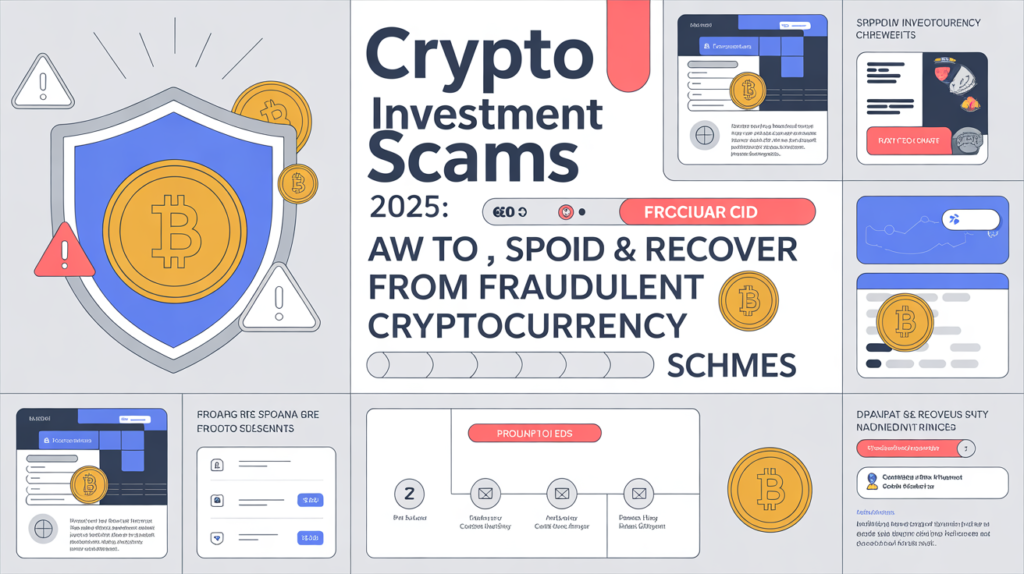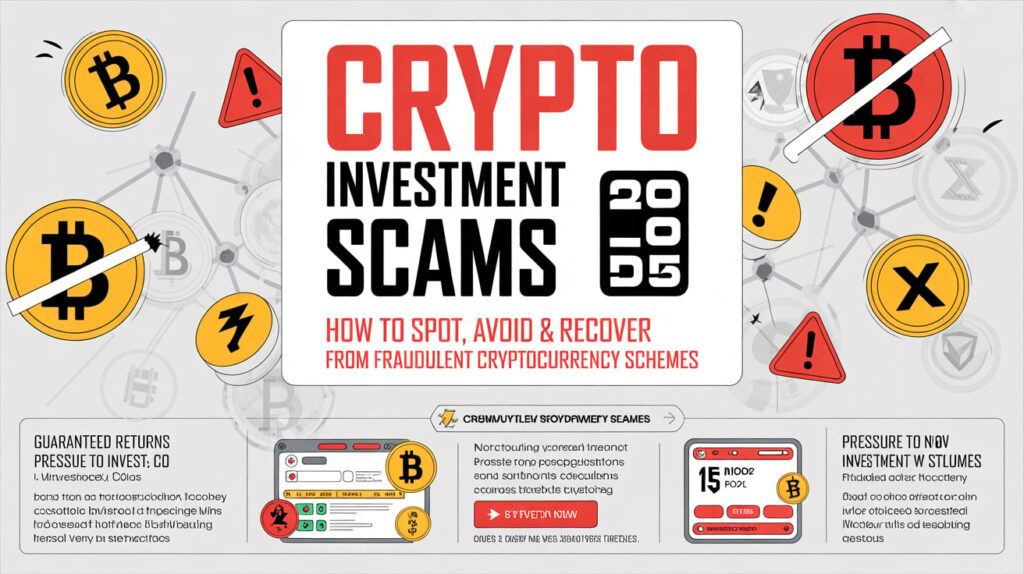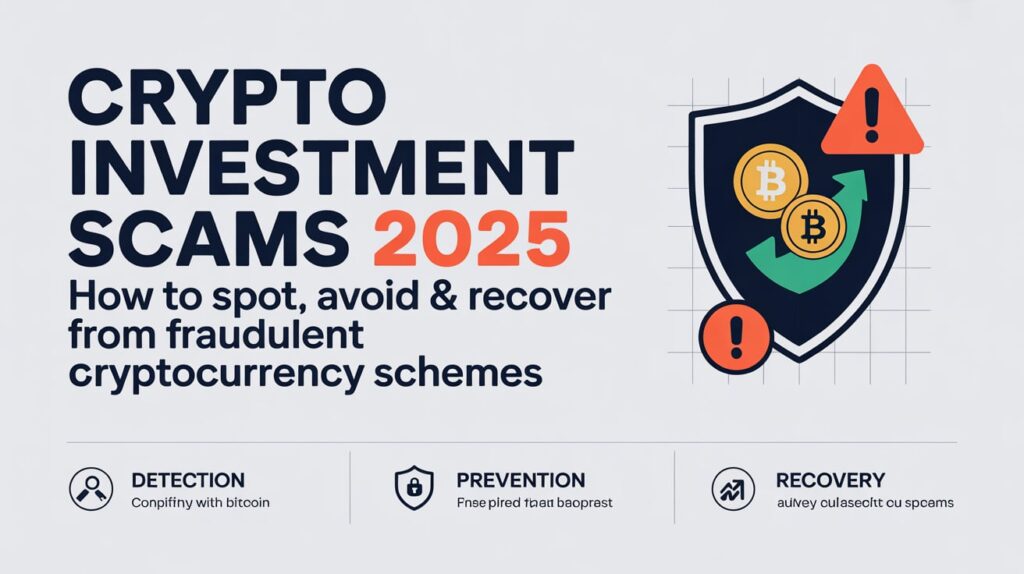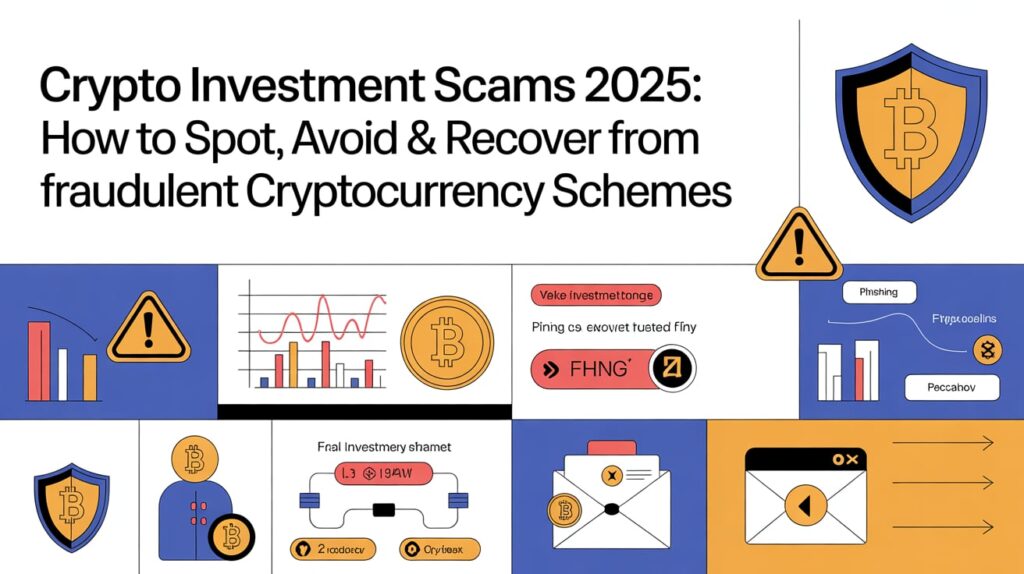Crypto Investment Scams 2025: How to Spot, Avoid & Recover from Fraudulent Cryptocurrency Schemes
As cryptocurrency continues to dominate financial innovation, the darker side of digital finance is also evolving. According to BTCMARKETNEWS, Crypto Investment Scams 2025 are more sophisticated, more deceptive, and more damaging than ever before.
While Bitcoin and Ethereum continue to gain mainstream legitimacy, scammers have adapted their tactics — blending cutting-edge technology with old-fashioned deception. Understanding these evolving threats is key to safeguarding your digital wealth in 2025.
The Rising Threat of Crypto Investment Scams
The cryptocurrency boom has created an environment ripe for exploitation. As digital assets become more accessible, scammers are leveraging social media, AI tools, and false promises of high returns to lure investors.
The Crypto Investment Scams 2025 landscape includes Ponzi schemes disguised as DeFi platforms, fake exchange apps, rug pulls, and impersonation attacks using deepfake technology.
A BTCMARKETNEWS investigation revealed that more than $5.4 billion was lost to crypto-related fraud in the first half of 2025 — a 32% increase from the previous year. The scams have grown not only in volume but in technical sophistication.
Top Crypto Investment Scams in 2025
1. Rug Pulls in DeFi Projects
DeFi (Decentralized Finance) platforms offer high-yield opportunities but also serve as fertile ground for fraud. Rug pulls occur when developers promote a token or project, attract liquidity, and then vanish with investors’ funds.
In Crypto Investment Scams 2025, rug pulls have become automated through smart contracts, making detection harder. Projects like “YieldNova” and “MetaSwapX” promised daily returns of up to 10% before disappearing overnight — classic examples highlighted by BTCMARKETNEWS.
2. Fake Exchange and Wallet Apps
Fraudulent exchanges mimic the design of legitimate platforms like Binance or Coinbase. Victims deposit funds, only to find that withdrawals are “under review” indefinitely.
Malicious wallet apps listed on fake websites or unofficial app stores are another growing threat. Once installed, they steal private keys, granting scammers access to user funds. BTCMARKETNEWS urges investors to only download apps from verified sources such as official app stores and project websites.
3. AI-Powered Impersonation and Deepfake Scams
In 2025, AI-generated videos and voices are being weaponized to scam investors. Deepfake influencers and executives claim to represent major crypto firms, endorsing fraudulent investment opportunities.
The Crypto Investment Scams 2025 trend shows a 200% increase in deepfake-related fraud, often spread via TikTok, YouTube, and Telegram. Victims are convinced they’re watching authentic endorsements from Elon Musk or Vitalik Buterin — only to lose thousands in fake presales or giveaways.
4. Ponzi and High-Yield Return Schemes
The “guaranteed profit” model remains a staple of crypto fraud. Scammers run websites offering unrealistic returns through “automated trading bots” or “AI-powered mining systems.”
Once new investor funds dry up, these platforms collapse, leaving early participants with minimal or no returns. BTCMARKETNEWS notes that Ponzi-style platforms often claim to use “blockchain transparency” to appear legitimate — a modern twist on an old scam.
5. Phishing and Social Engineering Attacks
Phishing remains one of the most effective tools in the scammer’s arsenal. Fake websites, Telegram groups, and emails mimic real crypto services, tricking users into revealing their seed phrases or wallet credentials.
In Crypto Investment Scams 2025, phishing has evolved with AI-generated emails that look convincingly human and target specific investors based on social media data.
How to Spot a Crypto Investment Scam
BTCMARKETNEWS experts emphasize these telltale warning signs of fraudulent crypto schemes:
-
Unrealistic Returns: Any project promising daily or guaranteed profits (e.g., “10% ROI per day”) is a red flag.
-
Anonymous Teams: Legitimate projects are transparent about their founders and developers.
-
No Audit Reports: Authentic DeFi projects undergo independent smart contract audits.
-
Pressure Tactics: Scammers use FOMO (Fear of Missing Out) to push instant decisions.
-
Suspicious URLs or Apps: Always verify domain names and download links before entering private keys.
-
Lack of Regulatory Compliance: Registered exchanges and financial entities display compliance details openly.
Vigilance and verification are your best defenses in the Crypto Investment Scams 2025 landscape.
How to Avoid Falling Victim
Staying protected in 2025 means combining education with technology. BTCMARKETNEWS recommends these best practices:
-
Use Hardware Wallets: Keep long-term assets offline to prevent online breaches.
-
Enable Two-Factor Authentication (2FA): Adds an extra layer of security to exchanges and wallets.
-
Check Project Credentials: Validate smart contracts on platforms like Etherscan or BSCScan.
-
Follow Verified Sources: Rely only on official social channels and news portals for investment information.
-
Diversify Investments: Avoid investing all funds in one token or project — risk management is key.
Remember: the golden rule of crypto investing is “If it sounds too good to be true, it probably is.”
What to Do If You’ve Been Scammed
If you fall victim to a scam, time is critical. BTCMARKETNEWS advises taking the following steps immediately:
-
Stop All Transactions: Disconnect your wallet or freeze exchange accounts to prevent further losses.
-
Document Everything: Keep screenshots, wallet addresses, and transaction hashes for evidence.
-
Report to Authorities: In the U.S., file complaints with the FBI Internet Crime Complaint Center (IC3) or FTC.
-
Contact Blockchain Forensics Firms: Companies like Chainalysis or Elliptic can help trace stolen funds.
-
Alert the Crypto Community: Post on verified forums to warn others and increase your chances of tracking the scammer.
While recovery isn’t guaranteed, proactive measures can improve outcomes and deter future fraud.
The Role of Regulation in Combating Crypto Scams
The Crypto Investment Scams 2025 landscape has forced regulators worldwide to strengthen consumer protection laws.
In the U.S., agencies like the SEC, CFTC, and FinCEN are tightening registration requirements for exchanges and token issuers. Meanwhile, global organizations are developing cross-border collaboration tools to track illicit wallets and freeze assets faster.
BTCMARKETNEWS reports that 2025 marks the first time regulatory bodies are leveraging AI-driven blockchain analytics to detect suspicious activity before major losses occur — a positive step toward protecting investors.
The Future of Crypto Security
Despite challenges, blockchain security is advancing rapidly. Smart contract audits, on-chain KYC systems, and decentralized reputation networks are helping rebuild trust.
The future beyond Crypto Investment Scams 2025 will depend on collective vigilance — from developers writing secure code to investors verifying projects before committing funds. Education and transparency will remain the pillars of a safer digital economy.
Conclusion
Crypto Investment Scams 2025 serve as a reminder that innovation and exploitation often evolve side by side. Yet with awareness, due diligence, and credible information from trusted sources like BTCMARKETNEWS, investors can outsmart even the most sophisticated fraudsters.
The future of crypto isn’t just about wealth — it’s about wisdom. Stay informed, stay cautious, and remember: ownership of your financial freedom begins with ownership of your knowledge.
FAQs – Crypto Investment Scams 2025
1. What are the most common crypto scams in 2025?
Rug pulls, fake exchanges, deepfake impersonations, and Ponzi-style investment schemes dominate the landscape.
2. How can I verify if a crypto project is legitimate?
Check for audit reports, transparent teams, regulatory compliance, and active community engagement.
3. Can stolen crypto be recovered?
Recovery is difficult but possible through blockchain forensics and quick reporting to authorities and exchanges.
4. What role do regulators play in preventing scams?
Agencies like the SEC and CFTC enforce laws requiring transparency, licensing, and fraud detection mechanisms.
5. Where can I stay updated on new crypto scams?
Follow credible sources like BTCMARKETNEWS for verified news, scam alerts, and recovery tips.



